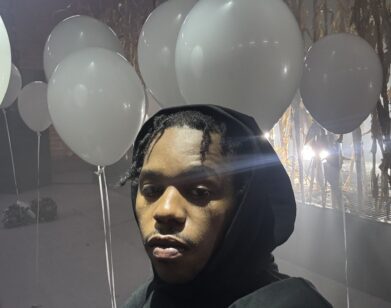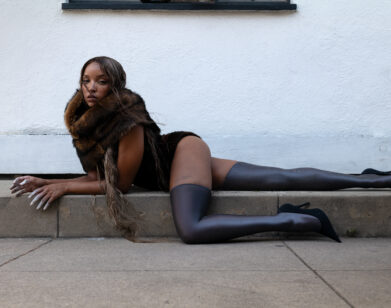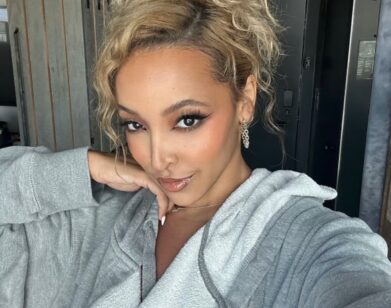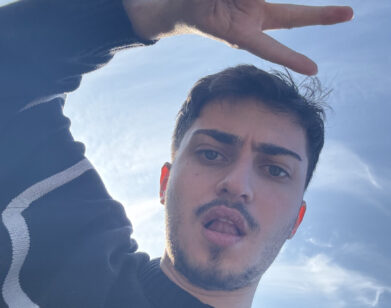“This Got Real Deep”: They. and Tinashe Tell Us How to Make Music That Heals and Relationships That Last
The R&B experimental hip-hop duo They., composed of Dante Jones and Andrew “Drew Love” Neely, have been gearing up to release a new project, The Amanda Tape, inspired by the ups and downs of their respective relationships with girls named, well, Amanda. The project explores and celebrates all those emotions inherent to human relationships, from sensuality to longing to the pain of missing someone. “Play Fight,” their recent collaboration with Tinashe—the singer, producer, and overall “queen,” as Jones describes her—is a summer-y R&B banger for the summer that never was. A few weeks ago, on “Play Fight” day, as Drew Love dubbed it, Nashe and They. got on a zoom call to discuss the responsibility of Black creatives during isolation, the healing power of music, and what makes a lasting relationship. —ERNESTO MACIAS
———
DANTE JONES: Tinashe, dang. It’s our honor. The queen.
ANDREW NEELY: I feel honored right now.
TINASHE: What’s up, y’all?
NEELY: Nothing. Over here chilling. What you doing?
TINASHE: Same. It’s just another day in quarantine. Actually, it’s not another day. The song is out. That’s exciting.
NEELY: Exactly. It’s “Play Fight” day.
TINASHE: We stan. My fans are really loving it. Are you guys excited?
NEELY: Oh, my god. Your fan base is so ridiculously die hard. Comments that I’ll see all the time…
JONES: Especially on Twitter, I see the enthusiasm. Every little thing they post about it, they’re everywhere.
TINASHE: “This is my favorite song.”
NEELY: They love it. It’s just crazy. That’s the first time I’ve seen a fan base like that.
TINASHE: Shout out to my fans. They’re awesome. I’m excited that they can get into all this new stuff. What made you guys want to get me on the record?
NEELY: We knew that we needed a female counterpart somewhere to tie everything together. We were looking for a very, very specific voice, and you have a really innocent, but sexy voice.
JONES: It needed to be a strong voice, too. It couldn’t just be like, “Oh, I’m floating in there.” So that narrowed it down. It’s crazy. We just decided, “Yo, we should reach out to Tinashe and see if she could do it.” Then we get it back, and we were like, “Damn, she killed it.” We didn’t even know.
NEELY: I was like, “I didn’t expect her to do that though.”
TINASHE: When you sent me that version, the verse was completely empty, right? I think it was the second verse?
JONES: It was empty. So you just went in and just did your thing with it. It’s funny because I was on my way to the Clippers game. It was a Clippers vs. Nuggets game.
TINASHE: R.I.P.
JONES: I know. I’m so glad I went to that game too because that was one of the last ones. I listened to it on the way there. Lo and behold, you’re there singing the national anthem.
TINASHE: Oh, my god.
JONES: Meant to be. I was like, “This is divine.” So from there, we knew we had to do it. You killed it.
TINASHE: That’s actually really funny. It was the energy, it was the universe. I love the song. That’s why it was easy for me to just hop on, write a verse. I think it took me two hours.
JONES: Oh, see, she quick with it. She like, “That’s easy.”
TINASHE: I recorded it in my home studio downstairs.
NEELY: Oh yeah, you was telling me you have a little home studio down there.
TINASHE: Y’all gonna have to pull up and check it out one of these days.
JONES: Definitely have to. Make another banger.
TINASHE: If you could describe “Play Fight” in one word, what would it be?
JONES: This is going to be a cop-out one. I’ll say “playfully.”
NEELY: That is a big cop-out. But it’s true. I’d say energetic. How was doing the National Anthem, Tinashe?
TINASHE: That’s always fun. I’ve been singing the Anthem since I was young for sporting events and stuff. I love sports, so it’s fun to be able to go to the games. You get tickets, you get to go backstage. I bring my whole family. Do you guys have more music coming out?
JONES: Actually, it’s a whole tape that’s about to come up. It’s called The Amanda Tape. Funny enough, I’ve been with my girl for a long time. Her name is Amanda. Neely shows up with this girl and she’s actually one of his first real serious relationships, her name is Amanda. Then our engineer started seeing a girl named Amanda. So the whole thing is just basically just the ups and downs of all of our relationships.
TINASHE: All of the Amandas.
NEELY: It was fitting. It worked out.
TINASHE: Are a lot of the songs about love and stuff?
NEELY: It’s all the ups and downs of a relationship. Obviously, you got your sexy songs, you’ve got your bedroom songs, and you got your fun dance songs as we got with “Play Fight.” But it also has a sex appeal to it. Then you got your sad songs and songs about, “Why don’t you mess with me no more? Why don’t you call me?” The whole relationship.
TINASHE: All that stuff when you’re going through it.
NEELY: Exactly. All the stuff you be going through.
TINASHE: That’s exciting. How many songs?
JONES: We got 11. No, about 10 right now, actually. We’ll see. It’s a full project.
NEELY: You definitely added the needed attitude for the second single, that pizzazz. You have that attitude that we needed on there. Everybody’s loving it.
TINASHE: Got to bring some flavor.
NEELY: It’s a flavor, exactly. I’m excited for our video that we shot.
TINASHE: It’s been so wild during the whole quarantine, trying to still make content.
NEELY: You’ve been knocking out video after video after video.
TINASHE: I’m trying. You got to be creative, if anything, during this time. How do you shoot the same kind of content with much fewer people and a smaller crew? All of those things that you typically have on a set, now you can’t really have on a set. We adapt. That’s the best part about being a true creative—you can always come up with some creative solutions.
NEELY: Exactly.
JONES: People’s availability is different. Things never go according to plan, so we’re used to that. You got to bob and weave with it.
TINASHE: That’s how I got started in the game of shooting my own videos, recording my own songs. How y’all been holding up in quarantine, though?
NEELY: It’s been interesting because, as you said, we can’t do anything that we normally can do. Going to the studio is a little weird. I’ve been working from home a lot. It taught me new skills that I didn’t have before. So that’s a good thing.
JONES: It’s obviously an adjustment. I’m used to being loud and being in my own little zone. So now I’m at the crib. I got two kids. They busting up into my room during work, like every 30 minutes. Even before this, I had to tell my daughter, “All right, I’m about to do something. Do not come to my room. Do not bust-up in there.”
TINASHE: Boundaries are gone.
JONES: There are no boundaries. But for the most part, it’s been good because I can spend more time with my family. I really get to focus a lot too. It was really good, especially for the final little touches on the project. It was good just to shut everything out, not having any distractions. So it’s been good for me too. I definitely feel like it’s a transformative experience. It gave me time to work on myself.
TINASHE: This is something to think about when you’re an artist: releasing music in a period of time where people can’t go to the club. People don’t consume music in the same way that they used to because their lives aren’t the same as they used to be.
NEELY: I was super worried about it, especially this song. I was like, “I want people out there at a cookout or at a pool party.” Are people going to listen to it in the right environment? Is it going to have the same effect when they’re in quarantine? So far so good, but it’s definitely interesting.
TINASHE: There’s no way it can be the same thing. But then, at the same time, what are we all going to do? Just stop releasing content?
NEELY: We don’t have that choice. We don’t have that option. No way.
TINASHE: Music keeps going.
NEELY: No matter what. We had to figure out a way to still make this shit work. It’s been out a whole 12 hours.
JONES: The world keeps going.
TINASHE: There’s no perfect timing for really, truly anything. Or if there is, do you know that it is when it is? I don’t know. Maybe not. It’s also obviously a weird abnormal time with all the Black Lives Matter stuff happening. We were really active with that, then trying to kind of switch gears, at least from a mental perspective, from focusing on the issues, to then refocusing on ourselves as artists. That was the transition, at least for me.
JONES: It was, for sure. We were both out there marching and making sure that we are part of it. We were actually supposed to drop a song right in the midst of it, and we pushed it back. We didn’t want to do anything that’s going to take away from what’s happening right now. This is a powerful thing. This is a once-in-a-lifetime opportunity to really bring attention to the issues that have been afflicting us, Black people, for generations.
We definitely wanted to make sure that we did something that was also given an opportunity. So we dropped this little light pack of instrumentals that we had been sitting on, for people to express themselves, whether it was anger, whatever they felt like they wanted to say, do it. At the same time, like you said, as artists we also got that responsibility to use our platform and use our voice to help others and to bring attention to the issue. It’s a tricky thing to navigate, but I feel like we all did it well and we were able to time it out the right way.
TINASHE: I also think as artists, especially as Black artists, that we still have a responsibility to continue to provide people with—I wouldn’t necessarily say an escape, because you never want to get away from the issues. The issues need to be talked about and faced, and it’s so important that we have those discussions. But there is something to be said for just bringing positivity to the world and giving people some content that feels lighthearted, happy, and full of love. It’s good to see Black people, Black love, and Black happiness.
NEELY: Music heals.
JONES: I always like to think that music is bigger than us; it’s bigger than a rollout. We’re making a soundtrack to people’s lives. It’s important, and even in a tough time, especially in the tough times, that the best music comes out. It’s our responsibility to keep providing for the people throughout everything that’s happening.
TINASHE: Facts. I think it’s important. I think people will gravitate towards it for that reason. It just feels good.
NEELY: It’s an infectious song, too. Real infectious. It takes one time to listen to it.
JONES: This might be one of my favorite interviews.
NEELY: You’re a natural. We know exactly what you’re going to do after you’re done with this.
JONES: If you ever need a late career pivot to something else.
TINASHE: They already tried to do me like that at the BET awards. Three years in a row, they were like, “Do you want to co-host the red carpet outside?”
NEELY: That would’ve been crazy. Your own talk show, Late Night with Nashe. Remember I said it.
TINASHE: That’d be kind of fun. It’s not bad. Got a ring to it.
JONES: It’s not a bad idea.
TINASHE: What’s the hardest lesson you’ve learned in love? That was on my cheat sheet.
NEELY: Dante, I’m going to sit back and think real quick. Get the wife going. I haven’t got that lucky yet.
JONES: I’ve learned a lot.
TINASHE: Amanda’s in the other room.
JONES: I’ve learned that you can’t have too many expectations. Expectations are a dangerous thing. At the end of the day, you got to understand that it’s two different people with two different aspirations, and you got to respect each other’s space and each other’s own path. I think that it’s good to just be accepting. That’s one of the main things that I’ve learned. People grow and develop. It’s about being patient.
TINASHE: Especially long-term.
NEELY: I’d say, honestly, one of the main things I’ve learned is you got to learn how to get out of your own way sometimes when it comes to relationships. A lot of the things that you try to project on other people or the things that you think are the issue sometimes come from within yourself, things that you need to fix within yourself that you think is wrong with the other person, and sometimes it’s not.
It’s a two-way battle that you don’t realize is going on sometimes between how you feel about that person and also how you feel about yourself, and things that you need to fix within yourself to make sure that a relationship flourishes all the way.
TINASHE: I think that’s the difference between mature relationships and ones that are obviously not. Mature ones are about the two people trying to grow as individuals together, versus immature relationships are just like, “You’re my boyfriend. You’re my girlfriend. You can do this. You can’t do that.” That’s that other shit.
JONES: That’s dangerous territory right there.
NEELY: Nobody likes to be told what they can and what they can’t do. That’s like the first no-no. You got to be able to let that person be free and have that trust. Just letting that person be themselves while also knowing that they’re probably, you would hope, working to be the best person for you and for themselves, and you’re doing the same thing. That’s when you’re in the best situation. What’s the biggest lesson you learned about love, Nashe? I’m going to split the question on you.
TINASHE: For me, mostly, it’s patience. I’m an impatient person in general. I don’t like waiting for stuff. I expect everyone to think the way that I think about things. I think it’s just being able to try to see other perspectives.
JONES: Communication is key. We all communicate differently. We all feel things a little bit differently. You can’t expect everybody to understand you and understand what’s going on in your head. Especially if you didn’t say it. Sometimes you just got to come out and just straight up say it.
TINASHE: Sometimes I just be saying shit and I expect everyone to communicate with me on the same level of transparency. I ain’t got no more questions. This got real deep.







